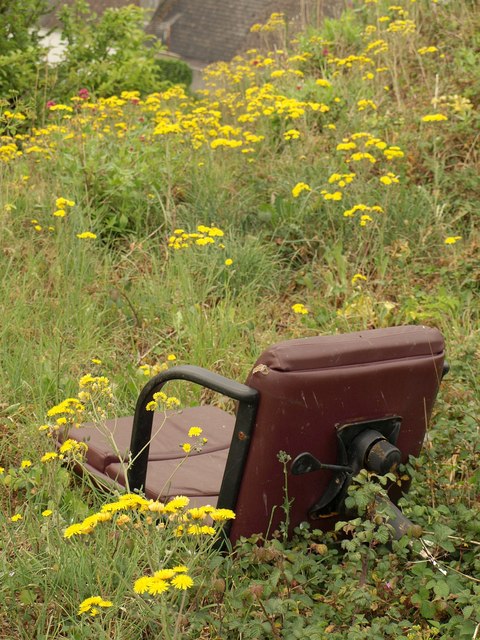
Discarded chair, Torquay, courtesy Derek Harper, Creative Commons Attribution-Share Alike 2.0 Generic.
I saw another chair on the curb. The old sadness washed over me at its being discarded in such a fashion: A public ejection from a private space, after good and faithful use, the rainy wait for the garbage truck, wet fabric and wood grain swelling, a scene that would end at the landfill. As many of them do, it still looked pretty good.
Some chairs are sons of bitches, of course, and deserve what they get. They spend their lives making fart noises at funerals, crushing tailbones at kid recitals, dragging their feet on the new floor, screeching, or snagging in the carpet like ragged toenails. Some chairs pinch, or press painfully into the back of your thigh, or lean you forward as if to say, The visit is over, get up. One of them conspired with Gertrude Stein to break under Ezra Pound, though she had recommended he sit in it, so she could never forgive him.
But so many chairs say, Rest in me, weary one. Rest your back against mine. Touch my arms with your arms, press your seat to mine. Let my legs stand the watch as you drink your tea, relax into the evening, speak of love.
Curb chairs are like those guys you see in Class Six liquor stores on military bases: Better not to mess around, because you never know. What looks like a cheap office chair might be a genuine Mies, and who knows which might be a legitimate Louis, not a bastard descendant? Mostly, though, I like the sturdiness, utility, and beauty of older furniture. If I think about it, I do not own a chair or sofa I bought new. They all came from curb rescues, garage sales, an auction, antique store, or inheritance.
The rocker in my living room was a curb chair. I saw it on my daily walk to the university when we lived in that other town and trotted back to the house to get the car to pick it up. The frame seems to be quarter-sawn walnut, but when I got the chair in hand I saw its springs were sprung, fabric ripped, and one of the back slats had pulled free, chipping the frame.
I ordered springs, twine, and padding from a young internet, bought some handsome fabric on remainder, and learned to tie the springs, cushion, and upholster it. I got frustrated with the broken slat and held it in place with some wood putty I never stained the right shade. One of my sons says the way it looked was a chief memory of his childhood. The rocker still serves daily, though its joints are loose now and groan, less from fatigue than from a sort of acknowledgment that we believe in its continuing existence.
We are told we should pick people to be in our lives by how they treat us, not by who we think they are. Why would chairs be any different?
